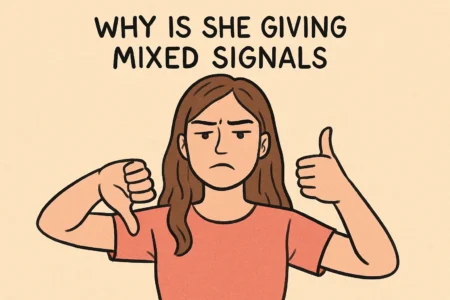The silence after a lie has a sound. It’s a thick, heavy, suffocating thing that seeps into the floorboards and clings to the curtains, turning a home into a house. If you’re reading this, you know that sound. You know the gut-punch of seeing the hurt in your partner’s eyes—a look you put there. The moments after are a chaotic blur of regret and panic. You want to fix it. Now. But you can’t. You can’t slap a bandage on this kind of wound and hope it heals. Trust isn’t just broken; it’s shattered. Now you’re left holding the pieces, wondering how you can possibly begin to put them back together.
It feels impossible. I know.
But it isn’t. The road back to trust is long and winding, and it will demand more raw honesty and patience than you think you have. This isn’t about finding a magic phrase to erase the damage. It’s about committing to a fundamental shift in your actions, embracing total transparency, and finding the strength to sit in the uncomfortable silence you created. This guide is a map for the woman who made a mistake and is ready to do the hard, soul-baring work of earning back the most valuable thing in her relationship.
More in Relationship Health Category
Key Takeaways
- Own It. Completely: Step one is a full-throated admission. No excuses, no blame, no “buts.” You have to take 100% ownership of the lie.
- Figure Out Your ‘Why’: Lies don’t just appear. You have to do the hard work of looking inward to understand the fear or insecurity that drove you to be dishonest.
- Apologize With Your Actions: An apology is not a one-time event; it’s a change in behavior. How you act from this moment forward is the only apology that matters.
- Become an Open Book: For a while, your life needs radical transparency. This means you offer information and reassurance before you’re even asked, helping your partner feel safe again.
- Patience Is Everything: Rebuilding trust is a marathon, not a sprint. You don’t get to decide when it’s over. You must respect their healing process, no matter how long it takes.
- Let Consistency Be Your Creed: Every promise you keep, every small truth you tell—it’s all a new brick in a new foundation. Your words have lost their value; your actions are your only currency now.
I Lied. Now What? How Do I Even Start to Fix This Mess?
That first moment the lie is out in the open is pure chaos. Your heart hammers in your chest, and you’d give anything to go back in time. You can’t. The only thing you can possibly control is what you do next. The first steps you take are critical; they set the tone for everything. One wrong move here—one defensive word—can make the hole you’re in impossibly deeper. So, for a second, just breathe. The storm has arrived, and you have to walk through it, not run from it. The goal isn’t to make the rain stop. It’s to show you’re willing to get soaked.
This is damage control, but not in the way you think. It’s about controlling your ego. It’s about swallowing your pride and making space for their pain, even when that pain is a mirror showing you your own failure.
Is It Better to Come Clean or Wait to Be Caught?
Always come clean. Every single time. Waiting to get caught adds a second layer of betrayal. The lie is the first wound; getting caught is the salt you pour into it. It tells your partner you weren’t sorry you lied, you were just sorry the truth came out. It screams that if they hadn’t found out, you would have let the lie live on. That can be even more damaging than the original deception.
Confessing is terrifying. It takes real courage. But it’s also an act of respect. It shows you honor your partner enough to give them the truth, no matter how ugly it is or how bad it makes you look. Coming clean is your first real chance to demonstrate change. It’s your first action that says, “I am choosing honesty now.” It won’t magically erase the lie, but it draws a clear line in the sand. Don’t wait. The brief comfort of your secret isn’t worth the catastrophic fallout of being discovered.
How Can I Apologize in a Way That Actually Means Something?
Let’s be honest, most of us are terrible at apologizing. We say things like, “I’m sorry, but…” or the classic, “I’m sorry you feel that way.” Those aren’t apologies. They’re deflections. To rebuild trust, the apology has to be real, and it has to land. A real apology has a few key parts. First, it shows you genuinely regret the pain you caused. It’s not about how bad you feel; it’s about how bad you made them feel. Use the words: “I am so sorry for the pain my lie caused you.”
Second, it takes total responsibility. No wiggle room. Not, “I lied because I was scared,” but, “I made the choice to lie. It was wrong. Full stop.” Third, it includes a commitment to change. It shows you know that words are cheap. A good apology should sound like this: “I am deeply sorry I lied. It was a selfish and cowardly choice, and I shattered your trust. I know you’re hurt and angry, and you have every right to be. I am ready to do whatever it takes to earn back your trust, starting right now, with complete honesty in everything.”
Why Did I Lie in the First Place? Unpacking the Real Reasons
After the apology, the real work starts. That work is internal. If you want to stop lying for good, you have to understand why you did it. A simple promise of “I’ll never do it again” is empty if you haven’t figured out what drove you to lie. This means taking a hard, uncomfortable look at your own fears, insecurities, and flaws. Without this step, you’re just patching a crack in a faulty dam. Sooner or later, the pressure will build, and it will break again.
This isn’t about finding an excuse. It’s about finding the source. An excuse lets you off the hook. Understanding the source empowers you to take real responsibility and make a lasting change. It’s a gift you give to your partner and to yourself.
Was I Trying to Avoid Conflict?
So often, a lie is just a flimsy shield. We use it to dodge a difficult conversation, to avoid seeing disappointment in someone’s eyes, or to sidestep a fight. You say you’re fine when you’re not. You say a bill is paid when you forgot. You leave out a detail you know will cause friction. The intent isn’t malicious; it’s to keep things smooth. But that kind of peace is a fragile illusion. It creates a relationship where real feelings are buried and problems fester just below the surface.
If this sounds like you, the way forward is to build a new tolerance for discomfort. You have to accept that healthy relationships have conflict. Disagreements aren’t a sign of failure; they’re a sign that two people are still engaged. You have to practice speaking your truth, even when your voice shakes. It’s about choosing the short-term pain of an honest conversation over the long-term poison of an easy lie. The more you do it, the less scary it becomes.
Did I Lie to Protect Myself or Someone Else?
This is a tricky one. We can convince ourselves that a lie is an act of protection. I once told my husband I’d paid off a small credit card debt when I’d actually just moved the balance to a new card. In my head, I was protecting him from financial stress. It wasn’t a lie, I told myself, just a… delay of the truth. When he found out, he was crushed. It wasn’t about the money. Not even a little bit.
He just looked at me and asked, “Did you think I couldn’t handle it? Did you think we weren’t a team?” In that moment, I realized my lie wasn’t about protecting him at all. It was about protecting myself from the shame of my own mistake. My lie told him that I’d rather face a problem alone, in the dark, than trust him to face it with me. It was a vote of no confidence in our partnership. When you lie to “protect” someone, you are robbing them of the truth and treating them like a child, not a partner.
Is This Part of a Bigger Pattern I Need to Address?
One lie can be a mistake. A pattern of them is a symptom of something much deeper. It’s time for some radical self-honesty. Is this the first time you’ve been caught in a major lie? What about in past relationships? With friends? At work? Do you find yourself bending the truth, omitting facts, or telling little white lies that grow? If so, you can’t treat this as a one-off event. It’s a coping mechanism you’ve developed, and it’s poisoning your connections.
Recognizing a pattern isn’t a reason to beat yourself up. It’s a reason to get help. This might mean finding a therapist to dig into the roots of this behavior. It could stem from childhood, anxiety, or a core belief that the real you isn’t good enough. Whatever the cause, you can’t fix a deep-seated pattern with sheer willpower. You need tools, strategies, and professional guidance to unlearn these habits and build a new way of being in the world—one based on integrity.
How Can I Show I’m Serious About Earning Their Trust Back?
After the words comes the most important part: the work. Your words are now worthless. They are Monopoly money. The only currency that has any value now is consistent, honest, transparent action. Your partner is watching everything you do. They are holding your actions up against your promises, looking for proof. You have to provide that proof, day in and day out, until your actions have been so consistent that they finally start to drown out the memory of your lie.
This is the grind. It’s the daily, unglamorous, painstaking work of being trustworthy. It will feel like you’re living under a microscope. You are. You have to accept that as a direct consequence of your choice. This is your opportunity to show, not just tell, that you are a different person now.
What Does “Being Radically Transparent” Actually Look Like?
Radical transparency is about proactively closing the information gap that your lie ripped open. It’s about offering up information to soothe the anxiety you caused. This isn’t about them becoming a warden and you a prisoner; it’s about you voluntarily removing all the dark corners where suspicion loves to hide. For a while, it might feel extreme.
It looks like this:
- Volunteer Information: Don’t wait to be asked. “Hey, just letting you know I’m leaving the office. I’m stopping for gas and should be home around 6:30.”
- Share Your Day: Be more descriptive. Not just “work was fine,” but “I had that meeting with Sarah this morning, and it went pretty well.” You’re inviting them back into the world your lie pushed them out of.
- Offer Access: If the lie involved your phone, email, or social media, voluntarily offering access can be a powerful move. The goal, as The Gottman Institute often advises, is to show you have nothing to hide. This isn’t forever. It’s a temporary bridge to help them feel safe again.
This isn’t punishment. It’s a strategy. You’re showing with your actions that there are no more locked doors.
How Do I Handle Their Questions Without Getting Defensive?
There will be questions. So many questions. They will probably ask you the same ones over and over again. This isn’t to torture you. It’s their brain, stuck in a loop, trying to piece together a reality that no longer makes sense. Every time they ask, they are checking for consistency. They are watching to see if you’ll get frustrated.
Your job is to answer. Patiently. Honestly. Every. Single. Time. When you feel that hot flash of defensiveness—that urge to snap, “I already told you this!”—take a breath. Remind yourself: I did this. This is the price. Their need for reassurance is more important than my frustration right now. Getting defensive sends a clear signal that you’re tired of atoning for your lie. To them, it feels like you just want them to “get over it,” which completely invalidates their pain.
What If They Keep Bringing It Up? How Much Is Too Much?
There will come a time when it feels like the lie is the third person in your relationship. It might pop up during an argument about something completely unrelated. It can become the trump card they use when they feel hurt. This is tough. On one hand, they need the space to process on their schedule. On the other, the lie can’t become a weapon used to control you forever. A healthy relationship can’t survive if one person is permanently in the doghouse.
After a good amount of time has passed, and you have been a model of consistency, it’s fair to open up a conversation. You can say something gentle like, “I know I hurt you, and I am still 100% committed to earning your trust back. I will always answer your questions. But it hurts our ability to move forward when you bring it up during arguments about other things. Can we work on that together?” This is a conversation that requires extreme sensitivity. You only earn the right to have it after months of solid, unwavering work.
It’s Been Weeks (or Months). Why Don’t They Trust Me Yet?
This is easily the most frustrating part of the process. You’ve done everything right. You’ve been an open book. You’ve been patient. You’ve been consistent. You feel like you’ve proven yourself, but they’re still suspicious. They still check up on you. You feel hopeless, maybe even a little resentful. What more can I possibly do? This is the point where most people give up. They see the slow pace of healing as a sign that it’s a lost cause.
Don’t stop. Please. The fact that they are still there—still questioning, still trying—is a sign that they want to trust you again. They just don’t know how. Your lie rewired their brain to see you as a source of danger. You are now, with every honest action, slowly and painstakingly rewiring it back. It’s a brutal process. Trust is built in tiny drops but is lost in a tidal wave. You caused the wave. Now you have to refill the ocean, one drop at a time.
How Long Does It Realistically Take to Rebuild Trust?
There is no calendar for this. It takes as long as it takes. Healing from a small lie might take a few months. Recovering from a deep betrayal that shatters the foundation of the relationship can take years. I learned this the hard way. Years ago, I reconnected with an old male friend online. The chats were innocent, just catching up. But I hid them from my partner. A classic lie of omission. When he saw a friendly message pop up on my phone, his world crumbled.
He didn’t see an old friend; he saw a secret. He saw months of me choosing to hide something. The “why” didn’t matter. All that mattered was the deception. It took us over a year to find our footing again. A year of me offering him my phone and passwords without him asking. A year of gut-wrenching talks where I just had to listen to how my secret made him feel. A year of him physically flinching when my phone buzzed. It was the hardest year of our lives. Anyone who gives you a timeline is selling you something. You have to surrender to the process.
What Are Some Small, Daily Actions That Prove I’m Changing?
Consistency isn’t about grand gestures. It’s about the boring, everyday stuff. It’s the relentless accumulation of small, trustworthy moments that does the real work.
Think about these small, trust-building bricks:
- Do What You Say You’ll Do: The most basic form of integrity. If you say you’ll call at 3, call at 3. If you say you’ll take out the trash, take it out.
- Be Specific: Don’t be vague. Instead of “I went out with some people from work,” say “I went to that new pub with Sarah and Tom from marketing.” Details paint a picture they can believe in.
- Be Proactive: If you’re going to be late, call them before they have a chance to wonder where you are. Think about their anxiety and meet it with information.
- Listen With Your Whole Body: When they talk, put your phone down. Turn and face them. Show them they are the most important thing in the room.
How Do I Cope When I Feel Like Giving Up?
You will want to give up. You will feel exhausted and unappreciated. In those moments, you have to have your own back. You need a support system outside of your partner—a friend, a therapist, someone you can vent to without judgment.
You also have to reconnect with your “why.” Why are you doing this? Why is this relationship worth fighting for? Write it down. The way he makes you laugh, the future you dreamed of, the comfort of his hand in yours. Keep that list close. When you feel like quitting, read it. Remind yourself that this pain is temporary, but the future you’re fighting for could be forever. And be kind to yourself. You messed up. You are not a bad person. You are a person doing the incredibly hard work of becoming better. That’s something to be proud of.
How Do We Move Forward and Make Our Relationship Stronger Than Before?
This might sound insane right now, but this whole crisis can be the thing that makes your relationship stronger and more honest than it ever was. A lie shatters the pretty illusion of perfection and forces you to get real. It makes you have conversations you were avoiding. Once you walk through this kind of fire together and choose to stay, the bond you forge is made of something stronger than steel. This is the hope you can cling to.
Can This Mistake Actually Be an Opportunity for Growth?
Absolutely. The lie was the symptom; it wasn’t the disease. The disease might have been bad communication, unspoken needs, or a fear of real intimacy. By dealing with the lie, you’re forced to deal with the real issues. You get to rebuild your relationship on a foundation of radical honesty, not quiet assumptions. You learn how to talk about your fears. They learn how to articulate their boundaries. You stop tiptoeing around each other and start really talking. It’s a painful path to a beautiful destination.
What Are Some Healthy Communication Habits We Can Build Together?
As you move out of crisis mode, be intentional about building new habits. Don’t just hope you’ll communicate better; create systems for it.
Try these:
- The Weekly Check-In: Set aside 30 minutes, phones off, just for you two. Ask: “How are we doing this week?” “Was there anything I did that made you feel secure?” “Was there anything that triggered you?” It creates a safe space to talk before things boil over.
- Use “I Feel” Statements: This is a classic for a reason. Instead of “You never listen,” try “I feel unheard when I’m talking and the TV is on.” It’s about expressing your feeling, not casting blame.
- Practice Active Listening: When your partner talks, your only job is to understand. Don’t just wait for your turn to speak. Listen, then repeat back what you heard: “It sounds like you’re saying you get anxious when I don’t text back right away. Is that right?”
When Is It Time to Consider Professional Help?
There is zero shame in asking for a map when you’re lost. A good couples therapist is a neutral guide who can help you both talk and listen better. Consider getting help if you’re stuck in the same looping argument, if the resentment just isn’t fading, or if you simply feel completely lost. Going to therapy isn’t admitting defeat. It’s a brave declaration that your relationship is worth fighting for.
The Choice to Repair
The journey to rebuild trust is really just a long series of choices. You chose to lie. Now, every single day, you must choose to be honest. You have to choose patience when you feel frustrated. You have to choose empathy over being defensive. You have to choose to be consistent when it’s inconvenient. And your partner has a choice, too. Eventually, they must choose to believe your actions over their fear. They must choose to take the leap of faith required to trust you again.
This is not an easy path. It will test every part of you. But if you walk it with humility and an unwavering commitment to integrity, you can come out the other side. You won’t be the same couple you were before. You’ll be a new version—one that has stared into the dark and chosen to pull each other back into the light. The scar might always be there, but it will be a testament to your resilience and a reminder of the value of the trust you fought so damn hard to rebuild.
FAQ – Rebuild Trust

What are the essential first steps to take after admitting to a lie in a relationship?
The initial steps involve owning the mistake completely, avoiding defensiveness, and demonstrating sincerity through transparent actions to begin rebuilding trust.
Why is coming clean immediately after a lie is discovered important?
Always coming clean is crucial because it shows respect and honesty, helps prevent additional betrayal, and is the first step towards demonstrating genuine change.
How can I make my apology meaningful and effective?
A meaningful apology must show genuine regret by acknowledging the pain caused, take full responsibility without excuses, and include a commitment to change through honest actions.
What internal work is necessary to stop lying in the future?
It involves understanding the real reasons behind the lying, such as fears or insecurities, rather than just making promises to stop, which helps address the root cause and prevent recurrence.
What daily actions can help demonstrate that I am trustworthy again?
Consistently doing what you say you will, being specific about your activities, proactively communicating, and actively listening are key daily actions to rebuild trust.




